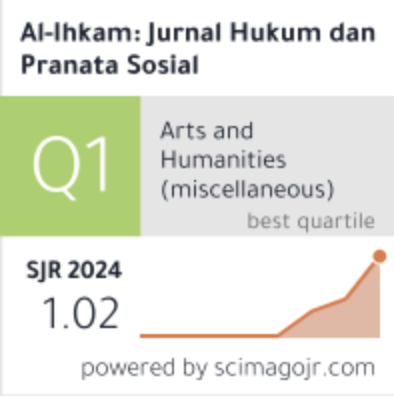Binsabin dan Tongngebban as Madurese Local Wisdom: An Anthropology of Islamic Law Analyses
 Abstract views: 755
,
Abstract views: 755
,
 PDF downloads: 566
PDF downloads: 566
Abstract
There is a unique tradition in the Madurese community of East Java, namely Binsabin and Tongngebban. Both are the absolute requirements for a valid engagement. It means that the engagement is not totally legal without the two things. In the perspective of Islamic law, this is permitted, but from an anthropological perspective, found that there is a social inheritance that is imposed on social bonds, the rules of marriage law and ceremonies in the marriage process. In line with that, this paper wants to describe a local wisdom in a proportional framework, not only seeing society legally, but also society must be seen as a culture (anthropology). This paper is collected from data interviews with two different types of community groups. The results of the study show that first, from an anthropological perspective; the binsabin and tongngebban traditions express the fulfillment of individual psycho-biological needs and maintain the continuity of life of social groups. Anthropology also shows strong the Madurese community is in upholding this tradition from generation to generation even though times round and round. Second, in the perspective of Islamic law, this tradition seeks to build three things, first building a strong agreement between fellow Muslim families, second establishing friendship so as to create a strong emotional bond, third sharing the joy that shown by giving gifts or goods so as to increase the strength of brotherly bonds by religious way (engagement).
Downloads
References
Abd al-Rahman Muhammad Uthman. ’Ain Al-Ma’bud. Beirut: Dar al Fikr, n.d.
Ahmad Warson Munawwir. Kamus Al-Munawwir. Surabaya: Pustaka Progressif, 1997.
Anwar Hafidzi and Norwahdah Rezky Amalia. “Marriage Problems Because of Disgrace (Study of Book Fiqh Islam Wa Adilâtuh and Kitâb Al-Nikâh.” Al Ihkam : Jurnal Hukum Dan Pranata Sosial 13, no. 2 (2018).
Asqalani, Ibn Hajar. Bulugh Al-Maram. Surabaya: Al Hidayah, n.d.
Asrori A. Ma’ruf Chafidh, M. Afnan. Tradisi Islami, Panduan Prosesi Kelahiran, Perkawinan, Kematian. Surabaya: Khalista, 2006.
Baal, J. Van. Sejarah Dan Pertumbuhan Teori Antropologi Budaya (Hingga Dekade 1970). I. Jakarta: PT. Gramedia, 1987.
Clifford Geertz. Proses Perubahan Ekologi Indonesia. Jakarta: Bhatara Karya Aksara, 1983.
H. Soeprijadi. “Local Public Figure.” 2020.
Malinowski, Bronislaw. Sex and Repression in Savage Society (1927). New York: Routledge, 2001.
———. “The Group and the Individual in Functional Analysis.” American Journal of Sociology, 1939.
Moleong, Lexy J. Metode Penelitian Kualitatif. Bandung: Rosda Karya, 2000.
Muhammad Ibn Isma’il al-Amir San’ani. Subul Al Salam. Beirut: Dar al-Kutub al-‘Ilmiyah, 1971.
Pongsibone, H. Lebba Kadorre. Islam Dan Budaya Lokal; Kajian Antropologi Agama. Edited by M. Fatih Mansur. Kaukaba Dipantara. I. Yogyakarta: Kaukaba Dipantara, 1967.
Radcliffe -Brown, A.R. Structure and Function in Primitive Society. London: Routledge and Kegan Paul, 1952.
Suhaimi. “Praktik Khitbah Di Madura Perspektif Hukum Islam Dan Hukum Adat.” Al Ihkam : Jurnal Hukum Dan Pranata Sosial IX, no. 2 (2014).
Tolib Setiady. Intisari Hukum Adat Indonesia. Bandung: Alfabeta, 2009.
Tony Rudyansjah. Antropologi Agama. Jakarta: UI Press, 2012.
Umi Supraptiningsih and Khoirul Bariyyah. “Marriage Settlement among Minority Moslem by Datok Imam Masjid in South Thailand.” AL-IHKAM: Jurnal Hukum & Pranata Sosial 14 (2019).
Urip Santoso. “Local Public Figure.” 2020.
Wahbah Zuhaili. Al-Fiqh Al-Islāmi Wa Adillatuh. Damaskus: Dar al Fikr, 2010.
Zaini. “Local Public Figure.” 2020.
In order to be accepted and published by Al-Ihkam: Jurnal Hukum dan Pranata Sosial, author(s) submitting the article manuscript should complete all the review stages. By submitting the manuscript, the author(s) agreed to the following terms:
- The copyright of received articles shall be assigned to Al-Ihkam: Jurnal Hukum dan Pranata Sosial as the publisher of the journal. The intended copyright includes the right to publish articles in various forms (including reprints). Al-Ihkam: Jurnal Hukum dan Pranata Sosial maintain the publishing rights to the published articles.
- Authors are permitted to disseminate published articles by sharing the link/DOI of the article at Al-Ihkam: Jurnal Hukum dan Pranata Sosial. Authors are allowed to use their articles for any legal purposes deemed necessary without written permission from Al-Ihkam: Jurnal Hukum dan Pranata Sosial with an acknowledgment of initial publication to this journal.
- Users/public use of this website will be licensed to CC-BY-SA.



.png)
_1.png)


_page-00011.jpg)


